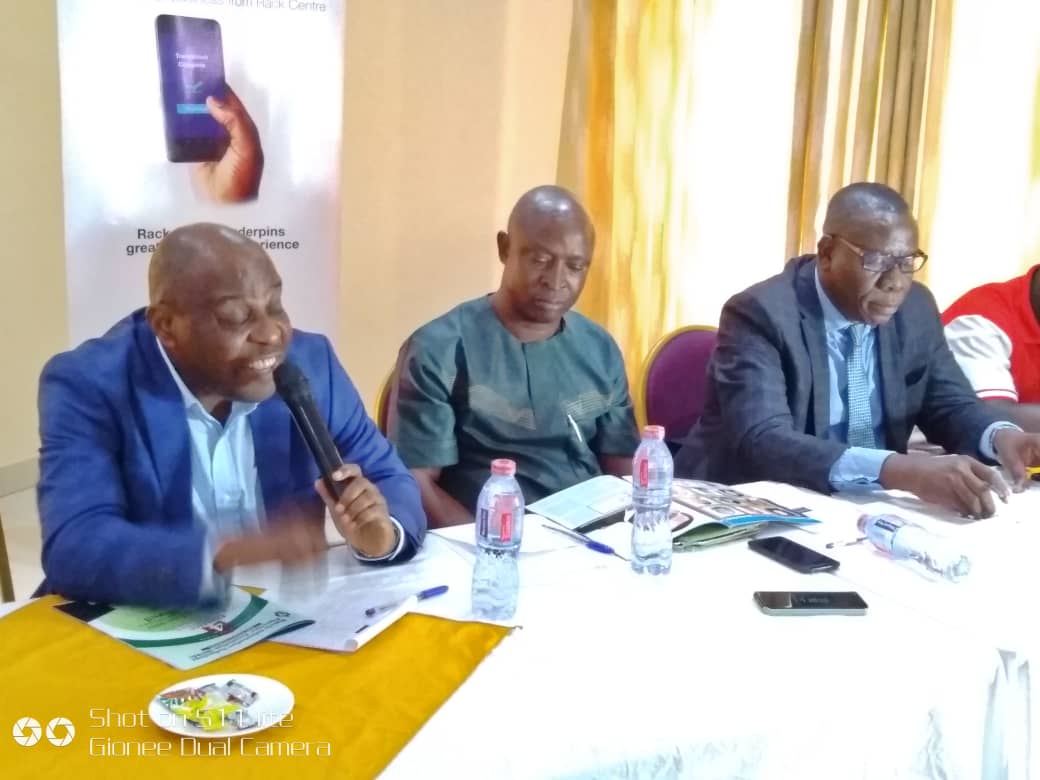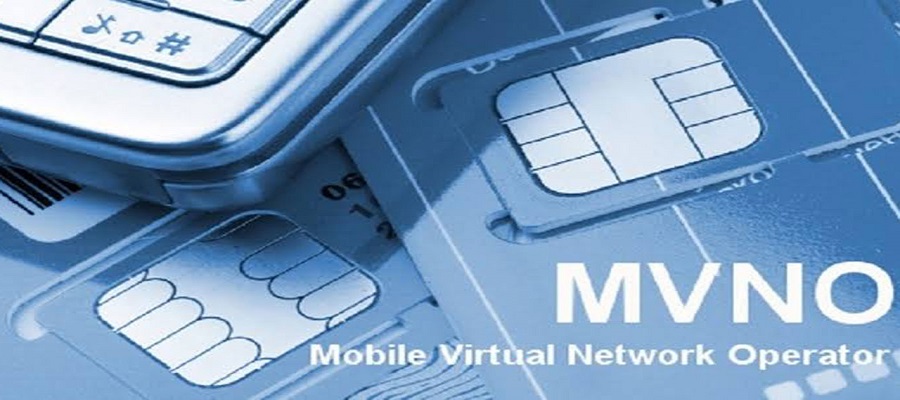Telecom
Broadband: Danbatta Reaffirms Commitment to Infrastructure for last-mile connectivity

Prof. Umar Garba Danbatta, Executive Vice Chairman/Chief Executive Officer, Nigerian Communications Commission on Friday reemphasized the commissions’ commitment in ensuring the provision of broadband infrastructure across the country to achieve last-mile connectivity.
He stated this at the 4th Quarter Seminar/Induction Ceremony of the Nigerian Information Technology Reporter’s Association (NITRA) held in Lagos.
The theme of the events was: ‘Achieving Last-Mile Connectivity through Affordable Broadband’.
Danbatta, who was represented by Dr. Henry Nkemadu, Deputy Director./ Head, Special Intervention Projects, NCC noted that Nigerian Communications Commission will ensure the provision of broadband infrastructure across the country to achieve last-mile connectivity.
He added that Communications Sector is a catalyst that would provide the needed infrastructure that will enable other sectors of Business, Education, Health, Agriculture, Governance, Finance to thrive.
According to him, “the Communications Sector provides the infrastructure to enable other infrastructures in the different sectors of Business, Education, Health, Agriculture, Governance, Finance and so on.
“The importance of this sector has continued to enhance human capabilities such as healthy life, knowledge, creativity, collaboration, innovation, self-organization and participation in the social, economic and political life of the country as well as impact on economic growth through productivity gains.”
He also revealed that the commission’s activities have impacted on efficient improvements in service delivery that enable national development.
Danbatta explained that telecommunication acts as an enabler to drive socio-economic growth, developments and modernization across all sectors of the economy.
He added that robust and reliable telecoms service lies on adequate broadband infrastructure which will provide the needed impetus to achieve last mile connectivity.
He further stated that the Commission has made plans for massive deployment of 5G infrastructure in the country.
He said, “At the Stakeholders Consultative Forum on 5G Readiness and High Altitude Platform Station Technologies in Abuja recently, the Commission announced its plans for massive deployment of infrastructure for the new technology.
“5G has the potential to be transformational for communities in Nigeria because of the set high requirements for 5G networks: fast, ubiquitously available services provided by infrastructure deployed across all regions.
“The 5G technology has significantly faster speeds and more reliable connections on smartphones and other devices.”
Mr Emma Okonji, Chairman, Nigeria Information and Communications Technology Reporters Association (NITRA) while delivering it opening speech said that broadband infrastructure is an enabler for economic and social growth in a digital economy.
He commended the 15 member committee inaugurated by former president Goodluck Ebele Jonathan to draw up national broadband strategy for a work well done.
He further commended NCC for achieving the 30 percent broadband penetration target that was set from 2013 to 2018.
Okonji extolled Danbatta’s passion for broadband development in the country, adding that it has further deepened broadband penetration and grew it to the 30.9 percent that we currently achieved.
Engr Gbenga Adebayo, Chairman of the Association of Licensed Telecom Operators of Nigeria (ALTON) decried the hostile business environment in the country, noting that it’s the reason why CDMA Company’s died.
He therefore called on the media to help in sustaining the environment by ensuring accurate reportage of the sector.
Adebayo, who was represented by Engr Aremu Olajide, chairman, Technical Committee, appealed on the media to always research on some of the laws being implemented by the state governments and ask questions on the areas of irregularities, citing the tax disputes between the Kogi government and mobile network operators as an example.
He condemned the multiple taxation Telco operators are being subjected to in the industry.
He further called on the support of the association in sustaining the industry through effective reportage.
Also speaking at the event, Dr. Ayotunde Coker, Managing Director of Rack Centre, said that cloud technology will transform Nigeria and Africa if we deploy it in sachet format.
He added that Nigeria run what he called a sachet economy, where we buy things in sachet form, stressing that deploying cloud in sachet format will ensure that it gets to the citizenry easy and faster.
Telecom
Lebara Nigeria, MVNO Oils Machine for Q3 Launch with Personalized Number Reservations

Lebara Nigeria is building excitement for its upcoming Mobile Virtual Network Operator (MVNO) launch, giving customers a chance to secure a personalized piece of their mobile identity.

The company has opened a Number Reservation Portal, allowing users to reserve their preferred mobile numbers before the official service goes live in the third quarter of 2025.
This strategic move is all about giving customers a sense of ownership from day one. Using the carrier’s 0724 prefix, users can choose a number that’s meaningful to them, whether it’s a birthday, a lucky number, or an easy-to-remember pattern.
The reservation process is straightforward. Users must be at least 13 years old and provide a few basic details to get a one-time password via email.
Once verified, they’ll need to enter their National Identification Number (NIN), which the system uses to confirm personal information.
After this, a list of available numbers appears, and a final confirmation email completes the reservation.
Lebara, a London-based global MVNO, according to yozzo.com, is no stranger to the telecom world, with a strong presence as a mobile virtual network operator (MVNO) across Europe and other regions.
Its entry into Nigeria is a calculated move to carve out a space in the highly competitive market.
By allowing customers to pick their numbers early, Lebara hopes to build loyalty and highlight its customer-first philosophy.
The company plans to operate a lean, technology-driven model by leveraging existing network infrastructure, which will help keep costs low and make its pricing competitive.
At launch, Lebara will offer nationwide coverage, a dedicated 0724 number series, and both SIM and eSIM options.
Beyond traditional connectivity, Lebara is also partnering with local government and the Ministry of Arts, Culture, Tourism, and Creative Economy to launch public Wi-Fi hubs and promote digital inclusion for creators and underserved communities.
The core of its proposition is affordability, transparent billing, and a strong customer service model designed to challenge established players.
Lebara’s entry won’t be without its challenges.
It will face off against many other competitors in Nigeria’s emerging MVNO space.
This wave of new entrants comes after the Nigerian Communications Commission (NCC) issued 46 MVNO licenses, with many of the licensees expected to have already launched.
Despite this, the local media’s focus has largely been on only a couple of them, Vitel and now Lebara.
Telecom
Why Half of MVNOs in Nigeria May Collapse- Experts

Telecoms stakeholders have cautioned that many Mobile Virtual Network Operators (MVNOs) in Nigeria could struggle to survive unless they address infrastructure gaps, target niche markets, and adapt to local realities.

The warning came during the sixth edition of the Telecoms Sector Sustainability Forum, organised by Business Remarks in Lagos on Tuesday.
According to the stakeholders, securing a license from the Nigerian Communications Commission (NCC) is not enough to ensure survival in a market dominated by major Mobile Network Operators (MNOs) like MTN, Airtel, and Glo.
Chidi Ajuzie, director of USK Mobile, highlighted the stark reality facing MVNOs, noting that none of the over 40 licensed operators have fully launched services.
“Licenses are not cash cows. Too many people think that once you get a license, the money will start rolling in. The truth is, you must build infrastructure, study the market, and create services that meet consumer needs. Without that, many MVNOs will die out quickly,” Ajuzie said.
Ajuzie pointed out that smaller operators, particularly those in Tier 4 and Tier 5 categories, face significant financial hurdles in building their own infrastructure to support capacity.
However, he sees this as an opportunity for innovation, urging MVNOs to target niche markets such as youth, migrant workers, or fintech services, as seen in successful models in South Africa and India.
“Half of us may launch, but only those with clear strategies will survive,” he warned, predicting mergers and consolidations in the coming years.
Tony Emoekpere, president of the Association of Telecommunications Companies of Nigeria (ATCON), echoed Ajuzie’s concerns, stressing that market differentiation is critical for MVNO survival.
“The MNOs already provide enterprise services, internet, and fintech. MVNOs must find gaps and focus on those,” Emoekpere said.
He cited Kenya’s M-Pesa, which revolutionized payments by targeting rural and low-income users, as a model for local innovation.
Emoekpere suggested that MVNOs could capitalize on Nigeria’s underserved rural areas, where millions lack access to reliable telecom and financial services. “Something as simple as a low-data package for POS machines in rural areas could be a game-changer,” he added.
Olusola Teniola, director, IPNX, cautioned against adopting foreign business models without considering Nigeria’s unique environment. “In some villages, people still travel by canoe or horse for hours to access basic services. If your business model doesn’t account for that, it will fail,” Teniola said.
He urged MVNOs to focus on the bottom of the pyramid, where millions lack basic connectivity, rather than competing for urban smartphone users.
Teniola also warned that failure to strengthen indigenous companies could lead to more profits leaving Nigeria through foreign-owned operators, emphasizing the need for policies to protect data sovereignty and foster local innovation.
The stakeholders said while MVNOs have the potential to expand Nigeria’s telecom sector and increase consumer choice, their survival hinges on strategic planning, niche targeting, and a focus on rural connectivity.
Without urgent action to address infrastructure challenges and adapt to local needs, many MVNOs risk disappearing before they can establish a foothold in Nigeria’s competitive telecom landscape.
Telecom
NCC Claims Nigeria’s Telecom Tariffs among Cheapest despite 50 Percent Hike

Nigerian Communications Commission (NCC) has defended the recent upward review of telecom tariffs, insisting that Nigeria’s rates remain among the cheapest in the world due to strong industry competition.

Speaking at a media briefing in Abuja recently, Dr. Aminu Maida, executive vice chairman, NCC, said that despite a 50% hike in tariffs, call rates have only moved from ₦15 per minute in the early 2000s to about ₦18–₦19 per minute today.
“Even with the increase, not all operators adjusted their tariffs. Some are still undercutting others. That is competition at work,” Maida explained.
He assured that the commission will continue to strengthen regulations to encourage competitiveness and transparency.
According to him, NCC is adopting an information disclosure strategy to enable consumers to make informed choices.
Maida also cautioned Nigerians against relying on Truecaller for identity verification, stressing that it is not linked to Nigeria’s SIM registration database and often provides misleading results.
He noted that while all SIMs in use are registered, some individuals deliberately use proxies, including domestic staff, to register SIMs an act he described as a crime.
The NCC boss disclosed that in September, the commission will launch a coverage and tariff map to help subscribers compare network quality and pricing across operators.
He further revealed plans for spectrum trades and leases to optimise usage and improve service delivery, adding that most Nigerian phones already support 4G, which remains the “sweet spot” for mobile broadband.
Maida emphasised the need for fresh capital and stronger corporate governance within the sector to sustain growth, enhance service quality, and strengthen national security.

 E-Financial3 days ago
E-Financial3 days agoFBNQuest Merchant Bank Facilitates Landmark ₦5Bn Commercial Paper Programme for Accion Microfinance Bank

 E-Business3 days ago
E-Business3 days agoNDPC Begins Probe of Banks, Others for Data Breaches

 Telecom3 days ago
Telecom3 days agoDigital Realty Commits to Africa’s Digital Transformation @ Launch of LKK2 Data Center

 E-Financial3 days ago
E-Financial3 days agoUBA to Deepen Financial Inclusion, Boost Savings’ Culture with Super Savers’ Promo

 Telecom3 days ago
Telecom3 days agoIntel–U.S. Partnership Reshapes Semiconductor Landscape with Historic Equity Agreement

 E-Financial3 days ago
E-Financial3 days agoFidelity Bank Resumes Intl Transactions on Naira Debit Cards

 E-Financial3 days ago
E-Financial3 days agoNigeria Leads Africa in Stablecoin Adoption with $22Bn in Transactions

 Telecom3 days ago
Telecom3 days agoNITDA Alerts Nigerians to eSIM Security Flaw Deployed to Hijack Devices Worldwide
























